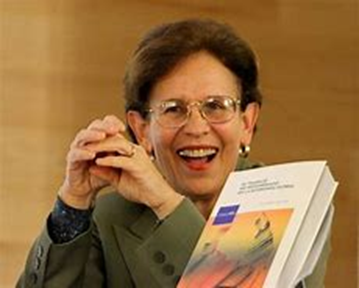
Brigida Garcia (1947 - 2020)
Dear Brígida, we missed more moments together and we missed one last hug… your departure caught us off guard... because it is always surprising that the essential can be absent… and the first reaction, the first thought is how are we going to continue without you? But our hearts will recover ... we will give continuity to your presence ... and through all the shared learning and the love that remains we will always feel you close ...
Brígida was born in Moca, Dominican Republic on May 13, 1947, where she spent her childhood and adolescence. When she was just 16 years old, she left her country of origin, first to the United States where she studied Secretariat and then a degree in Sociology. In 1969 she came to Mexico, initially only to prepare a master's degree, but life rooted her in Mexico where, in addition to her brilliant academic career, she developed her personal and family life. In 1973 she married Gustavo Garza, a distinguished economist and colleague, and together they formed a family, with their children Alicia and Ernesto.
To understand a little more about Brígida's academic and professional career, it is worth doing a brief review. Brígida studied for a degree in Sociology at Siena Heights College, Michigan (1963-1967). Later, she completed a master's degree in Demography at El Colegio de México (1969-1971) and a Doctorate in Sociology at the National Autonomous University of Mexico (1985-1987). She began her career as Professor and Researcher at the Center for Demographic, Urban and Environmental Studies (CEDUA) of El Colegio de México in 1971 and in 2019, she was awarded the recognition of emeritus professor of the university.
Her academic work revolved around three main themes: labor markets, family and gender. It delved into aspects related to women's labor participation, their autonomy, the division of domestic work, family life, and unpaid and care work. Her contributions on these issues had a very significant impact beyond the academic world, as they revealed (and questioned) deep gender inequalities that characterize the lives of women within families and in the social space. In this way, her work made central contributions to the feminist research agenda in Mexico and Latin America.
Recognizing and acknowledging Brigida’s life requires giving account of the impact she had on all the places and dimensions where she transited. For us demographers and students of the population, her academic work was obviously the initial vehicle of exchange. But her open, positive and generous personality inevitably led us to share with her far more than just the intellectual issues...
From her participation in and contributions to sociodemographic research in Mexico and Latin America, three facets of her deeply generous and human personality stand out and left their mark on us:
- Knowledge multiplier. Brígida was an exceptional teacher, who shared knowledge and resources without pettiness with her students and those whose theses she directed. She took care of her students like her own children, motivating and encouraging them to do their best. She established relationships with them that did not end with the course or with the thesis defense, but lasted forever, as she tried to keep abreast of them and their activities, years and decades after they had been her students.
- Determined advocate of new voices and researchers. Brígida had a deep vocation to guide and promote the careers of new professionals and researchers. She believed beyond any doubt in her young graduates and always tried to help them to find study or work opportunities, and bet on them over and over.
- Creator and promoter of intellectual collectivity. Brígida was always continuously involved in the generation and strengthening of collective spaces, and always promoting teamwork. Latin American demographers benefited particularly from this work, thanks to her commitment and enthusiasm in the formation of the Mexican Society of Demography (SOMEDE) and the Latin American Population Association (ALAP).
Brígida served as president of the Mexican Society of Demography (SOMEDE) (1994-1996) and played a central role in creation of ALAP, attending every one of ALAP’s conferences as an enthusiastic participant. She was also a member of ALAP's Lafam Network, of the Advisory Council (2009-2012) and of the Editorial Board of the Latin American Population Magazine (2015-2020). Brígida served as a member of the Governing Board of El Colegio de México (2003-2005) and El Colegio de Sonora (2007-2010) and, for many years, she served on the Human Reproductive Programme (HRP) Panel on Social Science and Operations Research on Sexual and Reproductive Health at WHO, where she supported global research and capacity building activities.
Brígida García joined the IUSSP in 1977, the year of the International Population Conference in Mexico, and has been an active member ever since. She participated as a member (1990-1994) and then as co-chair (1995-1999) in the IUSSP Committee on Gender and Population, and was instrumental in the publications that resulted from the Committee’s activities: Women, Poverty and Demographic Change (Brigida Garcia, OUP, 2000) and Women in the Labour Market in Changing Economies: Demographic Issues (Brígida García, Richard Anker and Antonella Pinelli, eds., OUP, 2003). More recently, she had served as a member of the IUSSP Panel on Family Demography in Developing countries (2011-2014) and was elected at the IUSSP General Assembly in Cape Town to be a member of the 2021 Nominations committee.
Brígida, adjectives are not enough to describe and recognize you: simple, loving, respectful, confident, supportive... friend.
We will follow your example by forming a community, becoming aware of our privileged position as academic intellectuals and, from there, promoting well-being and human solidarity. Through our daily research and teaching, documenting and proposing solutions to address the social and gender injustices and inequalities that worried you and mobilized your work.
Thanks, Brígida ... thank you always ...
Irene Casique, Universidad Nacional Autónoma de México
Irene Casique's original obituary in Spanish is posted on the ALAP website.
